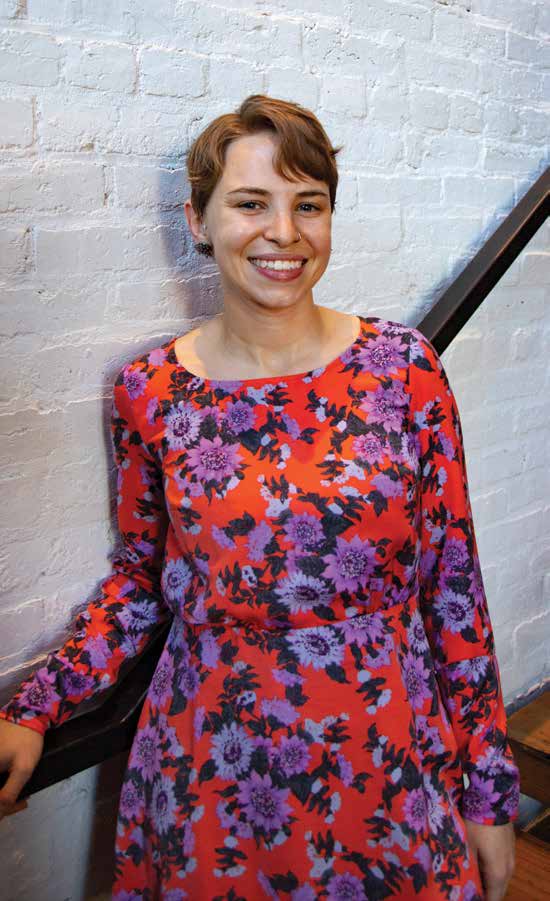DC MEMBER PROFILE: LAUREN REICHARD
June 16, 2023
Lauren Reichard, RN, on political activism.

Lauren Reichard joined the hospital staff at Capital Regi Health in Washington, D.C. in the summer of 2020, just a few months before the pandemic lockdown began. As a newly hired RN in the Intensive Care Unit, the demand of her job intensified quickly.
“I don’t even like to talk about that period,” she says. “The hospital brought in a lot of travel nurses and I’m very grateful that they were there. God knows what would have happened without them.”
Now that hospital life is returning to normal, however, it is time for management to think again. “It was a Band-Aid in an emergency and was never meant to be a permanent fix,” says Reichard. “If someone is only there for a short-term contract, you lose the buy-in for long-term improvement projects. They don’t know of a particular service that a patient could use in the community because they are not from here.”
Working with the 1199SEIU political action department, Reichard recently testified at Prince George’s County Council in favor of legislation designed to ensure adequate staffing ratios over the long term.
“Nurses now have a better understanding of their worth,” adds Reichard. “Providing bed ide care is demanding physical and emotional labor. It can even be dangerous. Patients who are confused often get violent. It is scary and uncomfortable and makes you think twice about how close you get to someone who could potentially harm you.
“Verbal assaults from family members is also common. Nobody wants to go into the hospital. It is not Disneyland. People are in a vulnerable state and emotions run high.”
Reichard acknowledges that safe staffing is not just about RNs. “Even if the nursing team is well-staffed, if there is only one person cleaning, not enough people to deliver food trays, not enough PCTs to monitor suicidal patients—there are still going to be problems,” she says. “Patient satisfaction will go down.”
Inadequate staffing levels across the care team seriously affect patient care and also makes the RN’s job harder.
Before joining the hospital staff, Reichard did not really under- stand what a union was. “I always liked to speak my mind,” she says. “I now realize that with the Union we can provide education to public officials. It is not just one person against the entire system.” Last year, Reichard went to the Maryland state capital, Annapolis, to testify in favor of legislation that will allow Medicaid to cover gender-affirming care. The Trans Health Equity Act, which later passed, requires the Maryland Medical Assistance Program to provide gender-affirming treatment in a nondiscriminatory manner.
“As an RN, I want to be very clear that gender affirming healthcare (GAC) is medically necessary,” Reichard told lawmakers. “With- out GAC, transgender people experience both psychological and biological distress. Transgender people who ‘look’ transgender face a lot of stigma that is traumatiz- ing and damaging to their mental health. Furthermore, trans patients are less likely to seek healthcare for physical conditions like wounds and preventable illnesses—I have had multiple patients who were transgender women that delayed coming to the hospital because they feared being stigmatized. If they had had access to affordable GAC, they may have been more confident in seeking medical treatment much sooner.”
Improving access to healthcare for vulnerable populations is something which Reichard feels passionate about. With tuition assistance from the 1199SEIU Training and Upgrading Fund, she will graduate in December with a Master’s Degree in Community and Public Health.
“There are so many preventative health measures that ensure that people can stay at home in- stead of in the hospital,” says Reichard. “Something as simple as being supported to find a primary care doctor that they can trust and feel comfortable with; making sure they can pick up and take their medication and healthy diet with access to nutritious foods; overcoming language barriers and simplifying the more complex medical forms.”
It is far too easy for insurance coverage to lapse accidentally. r a diabetic person, this can be catastrophic if they cannot get their insulin and they easily fall into a diabetic coma,” says Reichard, who also advocates wholistic approach to health.
“Healthcare is not just about going to the doctor,” she says. “So much of it takes place in your home.”
1199 Magazine: May / June 2023

